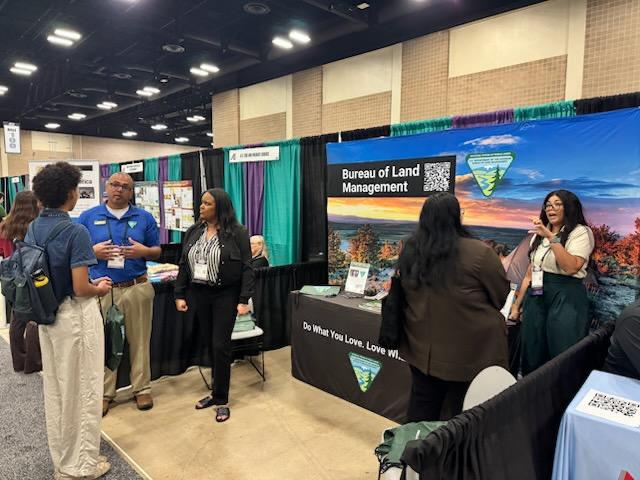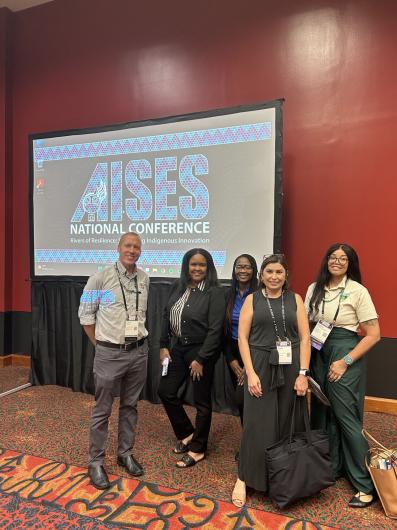You are viewing ARCHIVED content published online before January 20, 2025. Please note that this content is NOT UPDATED, and links may not work. Additionally, any previously issued diversity, equity, inclusion or gender-related guidance on this webpage should be considered rescinded. For current information, visit https://www.blm.gov/blog.
Bureau of Land Management participates in American Indian Science and Engineering Society conference

The Bureau of Land Management (BLM)'s inaugural participation at the American Indian Science and Engineering Society (AISES) Conference from October 2-5, 2024, marked a significant milestone, showcasing the agency's commitment to connecting with Indigenous professionals and students across the nation to BLM career opportunities.
AISES is a national non-profit organization dedicated to increasing the representation of Indigenous people in science, technology, engineering, and mathematics (STEM).
Its annual national conference was a three-day event held in San Antonio, Texas, and had over 3,500 participants, including Indigenous high school and college students, educators, professionals, Tribal nations, universities, corporations, and government agencies.
During the conference, the BLM hosted a booth at the career expo. The BLM also led an interagency presentation “Navigating Federal Careers” with the U.S. Geological Survey and Fish and Wildlife Service to provide information about applying for jobs on USAjobs.gov, resume building assistance, and Department of the Interior (DOI) internship programs.
"Representing the Bureau of Land Management at the AISES National Conference was an incredible experience,” Christal Smaw, BLM Alaska recruiter, said. “Connecting with so many students about career opportunities at BLM was truly rewarding. Partnering with other DOI agencies for the ‘Unlocking Federal Career Opportunities’ presentation provided us a platform to share career pathways and provide insights into the federal hiring process."

BLM’s participation coincides with a recently signed Memorandum of Understanding (MOU) with AISES. The purpose of the MOU is to introduce and engage AISES members to BLM STEM careers through career fairs, mentorship opportunities, presentations, and other events hosted by AISES.
With over 7,500 members and more than 200 university chapters across the United States and Canada, AISES offers BLM a valuable opportunity to engage with Indigenous students and professionals through more than 40 programs and events dedicated to student success, career development, and fostering equitable, inclusive institutions and workplaces.
The MOU is part of BLM’s outreach and recruitment plan to diversify to build, recruit, and retain a diverse, talented, and highly skilled workforce to handle future land management challenges.
Building partnerships with organizations like AISES, allows BLM to target candidates who have traditionally been underrepresented within the federal workforce, including Native American, Alaskan Native, and Indigenous communities.
“Successful recruitment strategies of indigenous professionals and students require agencies to get into the community and foster partnerships with groups that work directly with indigenous people,” said Brooke Wheeler, BLM Arizona Youth Lead, who leads the BLM’s participation at the AISES conference and facilitated the MOU partnership. “As a former AISES member, it means a great deal to me to give to connect BLM with the organization that have shaped my journey and brought me to where I am today.”
At the conference, BLM recruiters from California, Wyoming, Alaska, and Arizona engaged with students about their career goals in natural resources, environmental science, and tribal relations. Students emphasized the values they seek in their careers, such as giving back to their communities, living near family, working in inclusive environments, and contributing to environmental stewardship.
Many Native American and Alaskan Native students are drawn to fields that align with their cultural values but face challenges such as limited exposure to federal land management agencies, a lack of awareness about career opportunities, and restricted access to internships and mentorship.
By attending the conference and understanding these challenges, the BLM elevates its visibility and refine its recruitment strategies to be more culturally relevant, inclusive, and impactful.
Brooke Wheeler, Bureau of Land Management Arizona
Related Stories
- Yuma Field Office updates broaden volunteer opportunities
- Explore Arizona’s public lands on BLM-managed trails, OHV areas and more
- Where science meets stewardship
- BLM’s Mona Daniels honored for decades of service in Scouting and conservation
- New year, new beginnings for dozens of wild horses and burros in Arizona
